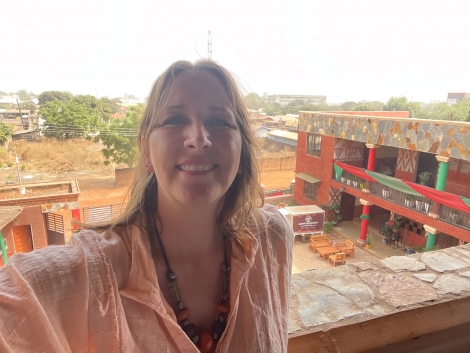Research and Teaching Interests:
Global environmental politics; Food politics; Critical development studies; Global political economy; Postcolonial and feminist science and technology studies; African agrarian studies; Contentious politics; Interpretive methodologies
Education:
Ph.D., 2015. Dissertation: Seeds of Contestation: Genetically Modified Crops and the Politics of Agricultural Modernization in Ghana. Department of Government and Politics, University of Maryland, College Park
M.A., 2007. Thesis: Indigenous Responses to Economic Globalization: Mobilizations Against Neoliberalism in the Ecuadorian Amazon. Department of International Relations, San Francisco State University
B.A., 2002. Global Studies, University of California, Santa Barbara
Teaching:
Sustainable Economies and Community Development
Food Security and Food Sovereignty
Decolonizing Technologies
Politics of Sustainable Development
Senior Seminar
Background:
Jacqueline (“Jacqui”) Ignatova joined the Sustainable Development Department in Fall 2015. Since joining Appalachian State University, Dr. Ignatova has led the expansion of food studies within the department and across campus through her teaching, research, and collaborative event planning that includes the High Country Food Summit, Against the Grain: Rural and Emancipatory Politics lecture series (with Dr. Rebecca Witter), a Seed Library Workshop with Dr. Gary Nabhan and Dr. Jim Veteto, and an “Arts of Resistance” workshop with Dr. James Scott. As a founding member of AppalFRESH (Appalachian Food Research for Equity, Sustainability and Health), Jacqui has been involved in the annual Community FEaST (Food Engagement and Story Telling) event that takes place each fall in Sanford Mall. Active in her community, Jacqui has served on the board of Blue Ridge Women in Agriculture (BRWIA) and is currently on the board of F.A.R.M. (Feed All Regardless of Means) Café. She finds that connecting with local food justice non-profits creates opportunities for students to deepen their engagement with the local community while helping to address community partners’ needs.
Dr. Ignatova has been conducting research in Ghana since December 2011 (supported through a 2012-13 Fulbright award) on the politics of food and agriculture in Ghana. Her first book, Contesting Africa’s New Green Revolution: Biotechnology and Philanthrocapitalist Development in Ghana, was published with Zed/Bloomsbury in 2021 and was nominated for an International Studies Association Global Development Section Book Award. The central argument of the book is that the “new Green Revolution” (nGR) is not “new,” not “green,” not a “revolution,” and not really “for Africa.” Utilizing a mix of political ethnography, interviews, and discourse analysis, she argues that agricultural development interventions that are a part of the “new Green Revolution for Africa” discursively frame these interventions as “pro-poor biotechnology” and a “win-win” that advances both poverty alleviation and business interests, yet the effect of these interventions is to enable global agribusiness corporations to gain a foothold into frontier markets. In contrast to the “hype” surrounding these nGR interventions, these agricultural technologies are not likely to present the totalizing effects that either their proponents or opponents claim; rather, northern Ghanaian farmers are likely to have pragmatic approaches in this technology adoption, “mixing” new technologies with traditional farming practices that best suit their needs.
Dr. Ignatova’s second book project in Ghana looks at how land use change, including the impact of gold mining that is rapidly expanding in the Upper East Region, may undermine food sovereignty and women’s economic autonomy through the destruction of shea, dawadawa, and baobab trees that are important sources of livelihoods, nutrition, and cultural reproduction. Drawing on feminist political economy and ecology, the project seeks to highlight the ways in which the expansion of the extractive sectors may undermine the viability of Indigenous
regenerative economies and may further obscure the contributions of women’s labor and nature. How do Ghanaian women navigate the clash between the extractive and regenerative economies that alter access to trees and reshape livelihood strategies?
Jacqueline Ignatova is a founding member of the University for Development Studies (Ghana)-Appalachian State University partnership. In 2022, Dr. Ignatova and co-PI, Dr. Eliasu Mumuni, were awarded a U.S. Embassy Accra University-to-University Partnerships’ Initiative Grant, “A
Unique Rural-to-Rural Partnership: Building Educational Exchanges between Appalachian State University and the University for Development Studies to Promote Food Security, Cooperation, and Sustainable Development,” to strengthen the partnership and fund reciprocal exchanges of faculty and staff in January 2023 and May 2023.

Title: Associate Professor
Department: Sustainable Development
Email address: Email me
Phone: (828) 262-7234